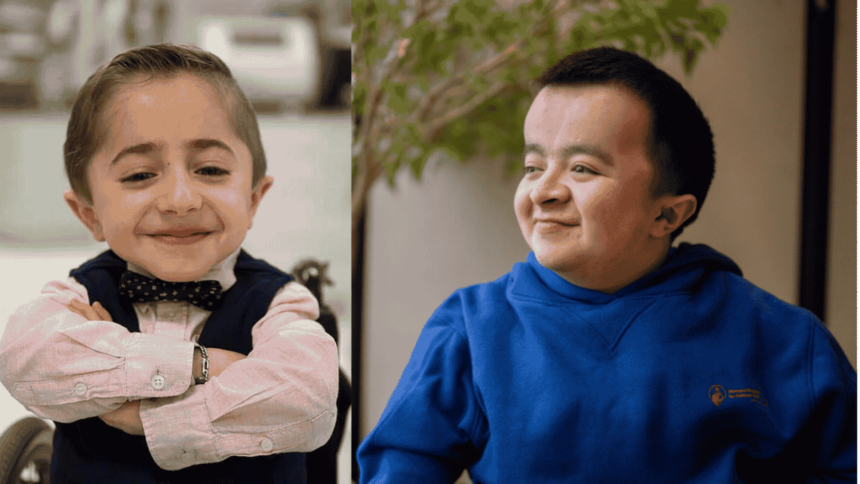Alec Cabacungan and Kaleb-Wolf De Melo Torres have become familiar faces for millions who’ve watched television commercials featuring Shriners Hospitals for Children. These two boys, full of energy and optimism, are more than just spokespeople; they are patients whose lives have been changed by the hospital’s exceptional Care. Alec and Kaleb’s appearances in these commercials raise essential questions about their roles and whether they get paid for participating in these advertising campaigns. This article explores Alec and Kaleb’s background, the purpose of Shriners Hospitals’ commercials, and whether the two boys receive financial compensation for their work. We’ll also explore how nonprofit organizations like Shriners operate, their reliance on patient advocates, and the actual value of advocacy beyond monetary rewards.
Alec Cabacungan: The Face of Shriners Hospitals
Alec Cabacungan is the most recognizable face of Shriners Hospitals for Children. Born with osteogenesis imperfecta (commonly known as brittle bone disease), Alec has faced numerous challenges in his life. Alec’s bright personality and determination have made him a beloved spokesperson despite his condition. Since joining Shriners’ advertising campaigns, Alec has appeared in numerous commercials, giving a voice to children facing medical hardships. His optimistic outlook and personal story resonate with audiences, creating a deep emotional connection with viewers.
Beyond his commercials, Alec has become a public figure, appearing in interviews and speaking engagements. His dream of becoming a sports broadcaster has also taken shape as he’s had the opportunity to interview professional athletes and commentators, further cementing his role in the public eye.
Kaleb-Wolf De Melo Torres: Another Inspiring Story
Kaleb-Wolf De Melo Torres is another charismatic figure featured in Shriners commercials. Born with a rare genetic condition, Kaleb has undergone numerous surgeries and treatments at Shriners Hospitals. Despite his physical challenges, Kaleb’s positive attitude and infectious smile make him another cherished spokesperson for the hospital.
Like Alec, Kaleb shares his journey in Shriners commercials, inviting audiences to support the hospital’s mission of providing world-class pediatric Care regardless of a family’s ability to pay. Kaleb’s presence adds another layer of relatability to Shriners’ advertising efforts, allowing more people to connect with the organization’s mission.
The Role of Shriners Hospitals for Children
Shriners Hospitals for Children is a network of 22 nonprofit medical facilities that provide specialized Care for children with orthopedic disorders, burns, spinal cord damage, and cleft lip and palate, among other issues. The hospital system operates to offer top-tier medical care to children, regardless of their family’s financial situation. The treatment provided by Shriners is free or heavily subsidized for families in need, supported by donations and various fundraising efforts.
A significant component of Shriners’ fundraising strategy is its commercials, which feature actual patients sharing their stories. Alec and Kaleb are the stars of many of these commercials, helping to put a human face on the hospital’s mission and its impact on children’s lives.
Do Alec and Kaleb Get Paid for Their Commercials?
The question of whether Alec and Kaleb get paid for their work in Shriners commercials is common. While Shriners Hospitals has not issued an official statement regarding the compensation of their spokespeople, several factors should be considered when addressing this question.
Shriners Hospitals for Children is a nonprofit organization that relies on donations and volunteer efforts. Nonprofit organizations often operate differently from for-profit companies when paying spokespeople, especially when they are also the organization’s patients. It’s likely that Alec and Kaleb’s work as spokespeople is voluntary or comes with symbolic compensation rather than being structured as a typical paid job. This could mean they receive some form of stipend or reimbursement for their time, but their involvement is likely more focused on advocacy than financial gain.
Alec and Kaleb’s appearances in these commercials aim to raise awareness and encourage donations to Shriners Hospitals. Their heartfelt stories and willingness to share their experiences help draw attention to the hospital’s work, making them invaluable advocates for the organization. Their passion for Shriners and its mission, rather than monetary rewards, likely drives their participation.
The Value of Advocacy and Raising Awareness
Alec and Kaleb’s involvement with Shriners Hospitals goes beyond simply appearing in commercials. They advocate for other children facing medical challenges and become ambassadors for the hospital’s mission. Their roles are not just about promotion; they represent hope, resilience, and the transformative power of compassionate medical Care.
While the question of whether Alec and Kaleb get paid is valid, it’s essential to consider the broader impact of their work. Their stories resonate with viewers, many of whom may never have heard of Shriners Hospitals otherwise. By sharing their journeys, Alec and Kaleb help secure donations that allow the hospital to continue providing free specialized Care to needy children.
Advocacy like Alec and Kaleb’s is priceless in nonprofit organizations. The emotional connection they create with audiences often leads to more significant support for Shriners Hospitals’ mission. Their value as spokespeople extends far beyond any potential paycheck.
How Nonprofit Spokespeople Are Typically Compensated
In the nonprofit world, it’s common for spokespeople to receive little to no financial compensation for their work, especially when they are patients or beneficiaries of the organization. While high-profile organizations sometimes hire celebrity spokespeople who are paid for their time, many nonprofits rely on volunteers or patient advocates like Alec and Kaleb. In these cases, compensation may come through travel reimbursement, stipends, or other non-monetary benefits.
Nonprofits often rely on passionate individuals who want to give back to the organizations that have helped them. Alec and Kaleb’s involvement with Shriners likely falls into this category, as they appear genuinely dedicated to helping raise awareness and support for the hospital.
Alec and Kaleb’s Impact on Shriners Hospitals
There’s no doubt that Alec and Kaleb’s presence in Shriners commercials has had a profound impact on the hospital’s visibility and fundraising efforts. Their emotional stories capture viewers’ hearts, helping Shriners reach a wider audience and secure vital donations. The success of these commercials is evident in the continued prominence of Alec and Kaleb in the hospital’s advertising campaigns.
In addition to their work on-screen, Alec and Kaleb have become public figures in their own right, representing the hospital at events and in media interviews. Their dedication to Shriners Hospitals is evident, and their advocacy has made a tangible difference in the lives of many other children who benefit from the hospital’s CareCare.
The Importance of Patient Advocacy
At the heart of Alec and Kaleb’s work is patient advocacy. As patients of Shriners Hospitals, they have firsthand experience with the hospital’s medical care. They become advocates for other children facing similar challenges by sharing their journeys. Their role is not just about promoting Shriners but about inspiring others who may need specialized medical Care.
Patient advocates like Alec and Kaleb are essential to the success of nonprofit organizations like Shriners. Their stories put a human face on the organization’s mission, making it easier for potential donors to connect with the cause. The emotional impact of hearing an actual patient’s story is far more potent than a simple advertisement.
Conclusion
Alec Cabacungan and Kaleb-Wolf De Melo Torres have become symbols of hope and resilience through their work with Shriners Hospitals for Children. While whether they get paid for their commercials is valid, the actual value of their work lies in their advocacy. Alec and Kaleb’s stories inspire countless individuals to support Shriners’ mission, and their involvement is likely driven by a deep personal connection to the hospital rather than financial compensation.
FAQs: Do Alec and Kaleb Get Paid for Commercials?
Who are Alec and Kaleb?
Alec Cabacungan and Kaleb-Wolf De Melo Torres are spokespersons for Shriners Hospitals for Children. Both have received medical care from the hospital and share their personal stories in their commercials to raise awareness and support for its mission.
What medical conditions do Alec and Kaleb have?
Alec Cabacungan has osteogenesis imperfecta, also known as brittle bone disease, which affects his bone strength and growth. Kaleb-Wolf De Melo Torres was born with a rare genetic condition that has required numerous surgeries and treatments.
Do Alec and Kaleb get paid for their appearances in commercials?
There is no official information regarding Alec and Kaleb’s compensation. However, as spokespeople for a nonprofit organization like Shriners, their involvement is likely voluntary or may come with symbolic compensation such as stipends or reimbursements. Their role is focused more on advocacy than financial gain.
Why do Alec and Kaleb appear in Shriners Hospital commercials?
Alec and Kaleb share their personal experiences in Shriners commercials to raise awareness about the hospital’s work and encourage donations. Their stories help connect viewers with Shriners’s objective, which is to provide medical treatment to children regardless of their families’ financial situations.
What is the purpose of Shriners Hospitals for Children commercials?
Shriners Hospital’s commercials primarily aim to raise awareness and funds for the organization. By featuring actual patients like Alec and Kaleb, the hospital demonstrates the impact of its services, inspiring viewers to donate and support its ongoing efforts to help children in need.






